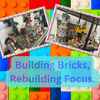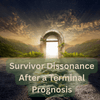Navigating Work with a Terminal Cancer Diagnosis

Navigating Work After a Terminal Cancer Diagnosis
Navigating Work After a Terminal Cancer Diagnosis
I originally wrote this for LinkedIn, but I wanted to share it here too. After returning to the platform following a long hiatus and receiving a terminal cancer diagnosis, I felt compelled to open up. I titled this piece "Navigating Work with Terminal Cancer," because that is what I am living—and learning—every day.
Facing a diagnosis like Glioblastoma can be incredibly overwhelming. Speaking about it openly can be just as hard. But through my own journey, I have found comfort and community through writing. That is why I started my blog—to talk about the things most people shy away from. Work. Death. Resilience. Meaning.
The Immediate Reaction: Step Back or Show Up?
When Work Becomes Uncertain
When I was diagnosed four months ago, my first instinct was to stop working. The fear, the unknown, the emotional tsunami—all of it made me want to retreat. But that pause did not last long. I realized I was not going to die tomorrow. I still had responsibilities, bills to pay, and people who relied on me. And just as importantly, I had a desire to keep contributing to the world—on my terms.
Not all terminal cancer diagnoses are as grim or immediate as Glioblastoma, and not everyone reacts the same way. Some people press pause entirely. Others continue their 9-to-5s without missing a beat. Both paths are valid. Because this choice—whether to continue working or not—is deeply personal. And only you can make it.
Balancing Illness and Identity
The Role of Work in Our Lives
For many, work is more than just a paycheck. It provides structure, purpose, community, and self-worth. After a terminal cancer diagnosis, all of that gets shaken. You start asking hard questions: Do I want to spend my remaining time working? Can I still work in a meaningful way? Will my health allow it? Will my employer support me?
There is no universal answer. What matters is what you need. For some, staying employed provides a sense of normalcy and mental stimulation. For others, stepping away is a chance to focus on healing, family, or fulfilling a bucket list. Both options are courageous. Both require introspection and support.
Key Considerations When Working with Glioblastoma or Terminal Illness
Treatment and Energy Management
Your treatment plan—whether surgery, chemotherapy, radiation, or clinical trials—will affect your energy, availability, and emotional state. Glioblastoma treatments vary depending on the tumor’s location, size, and the patient's overall health. Consider how treatment schedules and side effects may impact your ability to fulfill your work duties consistently.
Fatigue, brain fog, and nausea are common, and each can make daily tasks more difficult. Flexibility becomes essential. Remote work, adjusted hours, or modified responsibilities can help bridge the gap between your needs and your employer's expectations. Communication and planning go a long way here.
Building a Support System
No one should go through this alone. Surround yourself with a network of medical professionals, caregivers, supportive coworkers, family, and friends. Each one plays a unique role. Your doctor can help you understand how treatment might impact work. Your employer might offer resources you are not aware of, such as disability accommodations, paid leave, or employee assistance programs.
There are also online support groups and forums filled with people navigating similar paths. These communities can be a lifeline—offering tips, empathy, and shared understanding that even your closest friends might not be able to provide.
Protecting and Prioritizing Quality of Life
Work should enhance your life—not drain it. If your job supports your emotional well-being and gives you purpose, hold onto it. But if it adds more stress than strength, let it go or scale back. What matters most is how your choices affect your daily peace, your relationships, and your spirit.
Explore what brings you joy: writing, walking, laughing, reading, time with loved ones. These are not luxuries—they are essentials. And if palliative care or mental health support helps, embrace those resources with the same courage you bring to everything else.
Financial and Practical Realities
Weighing the Pros and Cons
There are practical considerations too. Can you afford to take time off? Will continuing to work keep your insurance active or help cover treatment costs? Does working help you avoid boredom or provide a sense of routine?
Jot down the pros and cons. Talk to a social worker or financial advisor. Create a plan. And most importantly, revisit that plan often—because what works one month may not the next. Flexibility is survival when living with terminal cancer.
Final Thoughts: You’re Still in Control
A terminal cancer diagnosis like Glioblastoma shakes everything. But it does not erase your autonomy. You still get to choose how you live. And that includes how, where, and whether you work.
This blog is a place where I share what I learn along the way—because someone out there might need it. If you are facing similar questions about work, identity, and survival, know this: your path is your own. You are allowed to change your mind. You are allowed to rest. And you are allowed to keep showing up however and wherever you can.
💬 I would love to hear from others navigating this space. Are you still working? Did you stop? What helped you decide? Drop a comment or send a message. Let us make this journey less lonely—together.
Helpful Resources
- Legal Rights at Work (Cancer and Careers)
- American Cancer Society: Work and Cancer
- Read More from JohnVsGBM
Tags: Terminal Cancer, Working with Cancer, Brain Cancer, Glioblastoma, Cancer Employment Rights, Emotional Health, Cancer Diagnosis, Coping with Illness, JohnVsGBM Blog



 NEW ARRIVALS
NEW ARRIVALS APPAREL
APPAREL GIFT AND HOME
GIFT AND HOME COLLECTION'S
COLLECTION'S HOPE HUB
HOPE HUB BLOG
BLOG



